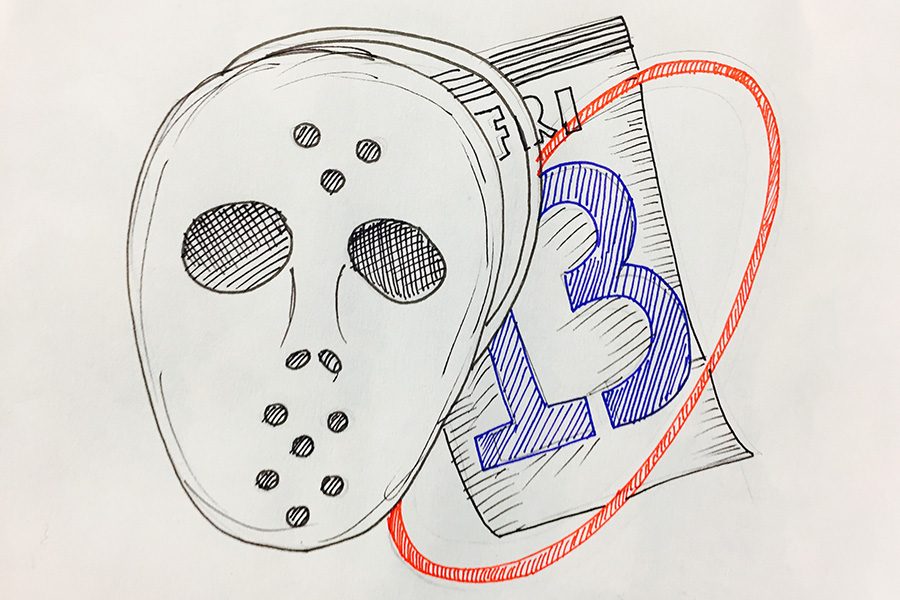A day to dread
How a simple date became a miniature holiday
October 13, 2017
Few days will ever reach the status of superstition and fear that Friday the 13th has acquired. Friday the 13th is seen as unlucky and in some cases, a day to dread. Having a Friday the 13th is exciting enough but during the month of October, it seems even more noticeable.
The exact origins of Friday the 13th are unclear, but the superstition of the number 13 stems from biblical times. It all started with the Last Supper, the last meal that Jesus shared with his disciples before his crucifixion. Judas Iscariot, the man who betrayed Jesus, was believed to be the 13th guest of the Last Supper. It is also believed by some that either the Last Supper or the crucifixion of Jesus occurred on a Friday the 13th, although it has never been confirmed.
Being influenced by the Bible, the number 13 has historical value. Some think that there are 13 steps to the gallows, an execution by hanging. Along with the steps, some believe that the warrant that was issued for the arrest of Templars on Friday the 13th, October 1307, affected the day.
The belief that the arrest of the Templars caused this superstition was popularized by Dan Brown’s “The Da Vinci Code.” Some believe that Friday the 13th wasn’t associated with bad luck until 1907 with the release of “Friday, the Thirteenth” by Nathaniel Lachenmeyer. Lachenmeyer argues that although 13 had been an unlucky number and Friday had been an unlucky day, the two weren’t a concept before the 1900s.
The history behind the date is rather confusing. However, the future of the day is certain. Every month that begins on a Sunday will have the 13th fall on a Friday, and the longest possible time a person can go without experiencing this date is 14 months. Friday the 13th is inescapable as there is at least one every year. To some, this is a horrifying revelation.
For many people, Friday the 13th is not a day of things to do, it’s a day of things not to do. Don’t go out. Don’t buy that car. Don’t get married. The fear of the day has been deemed Paraskevidekatriaphobia, which stems from the fear of the number 13, Triskaidekaphobia. The root of Paraskevidekatriaphobia comes from Paraskevi, the Greek word for Friday. The fear of the date is also known as Friggatriskaidekaphobia, appropriately named after the Norse goddess for Friday, Frigg.
While others saw fear in the day, Sean S. Cunningham and Victor Miller saw opportunity, as they created “Friday the 13th” in 1980.
The film would go on to gross over $39.9 million in American box offices and spawn multiple sequels and a reboot. It not only impacted the horror genre, but also popularized the date we know as Friday the 13th even more.
Along with being made famous by the popular movie franchise, the day gained notoriety through a group in the late 1800s known as The Thirteen Club. The group was determined to give the number 13 a good reputation and began to defy superstition by provoking it. The 13 members would break mirrors, walk under ladders and other similar things while meeting on the 13th of every month. As the group grew larger, so did the superstition for the day amongst the believers. Contrary to the original purpose of clearing 13’s name, the club just made the day more notorious.
However, not everyone worldwide sees Friday the 13th as the evil day. In Spanish speaking countries, Tuesday the 13th is seen the same as Friday the 13th. In Italy, Friday the 17th is the unlucky day, occurring only when the month starts on a Wednesday.
Even though it is seen as unlucky by the masses, maybe it isn’t that unlucky, maybe it’s just rare. After all, an asteroid by the name of 99942 Apophis will safely pass by Earth on Friday the 13th in April 2029. So, maybe it isn’t that unlucky; however, it’s still fun to think about and acknowledge.





















